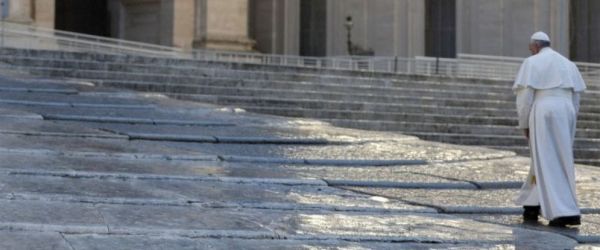Today we reflect on Christian hope as the strength of martyrs. When in the Gospel Jesus sends the disciples on mission, he does not mislead them with mirages of easy success. On the contrary he warns them clearly that the proclamation of the Kingdom of God always involves opposition. And he also uses an extreme expression: “and you will be hated — hated — by all for my name’s sake” (Mt 10:22). Christians love but they are not always loved. Jesus places us before this reality from the start. In a somewhat strong measure, the confession of faith occurs in a hostile climate.
Christians are therefore men and women who “go against the tide”. It is normal: because the world is marked by sin which manifests itself in various forms of selfishness and injustice; those who follow Christ walk in the opposite direction. Not due to an argumentative spirit, but because of loyalty to the rationale of the Kingdom of God, which is a logic of hope that translates into a lifestyle based on the instructions of Jesus.
And the first instruction is poverty. When Jesus sends his [disciples] on mission, it seems that he takes more care to “strip” them than to “clothe” them! In effect, a Christian who is not humble and poor, detached from wealth and power and, above all, detached from self, does not resemble Jesus. Christians travel their path in this world with the essentials for the journey but with their heart filled with love. The true defeat for him or for her is to fall into the temptation of revenge and violence, responding to evil with evil. Jesus tells us: “I send you out as sheep in the midst of wolves” (Mt 10:16). Therefore without jaws, without claws, without weapons, the Christian will have to be rather prudent; at times even shrewd. These are virtues that are accepted by the logic of the Gospel. But never violence. In order to overcome evil, one cannot use the same methods of evil.
The only strength Christians have is the Gospel. In difficult times, one must believe that Jesus is before us and does not cease to accompany his disciples. Persecution is not in contradiction to the Gospel but rather is part of it. If they persecuted our Teacher, how can we hope to be spared the fight? However, in the midst of the storm, Christians must not lose hope, thinking that they have been abandoned. Jesus assures his disciples: “even the hairs on your head are all numbered” (Mt 10:30); as if to say that none of man’s suffering, not even that which is most minute and hidden, is invisible to the eyes of God. God sees and certainly protects; and he will give his redemption. There is in fact in our midst Someone who is stronger than evil, stronger than the mafia, than the obscure conspiracies of those who profit at the expense of desperate people, than those who crush others with disdain.... Someone who has always listened to the cry of Abel’s blood from the earth.
Christians therefore, must always be found on the “opposite side” of the world, that chosen by God: not persecutors but persecuted; not arrogant but meek; not charlatans but submissive to the truth; not imposters but honest men and women.
This fidelity to Jesus’ style — which is a style of hope — until death, was to be called a beautiful name by the first Christians: “martyrdom”, meaning “witness”. There were so many other possibilities offered by the vocabulary: it could have been called heroism, abnegation, self-sacrifice. Yet the Christians of the first hour identified it with a term that suggests discipleship. Martyrs do not live for themselves; they do not fight to assert their own ideas, and they accept having to die solely out of loyalty to the Gospel. Martyrdom is not even the supreme ideal of Christian life, because over and above it there is charity, that is, the love of God and of neighbour. The Apostle Paul says it very well in the hymn to charity, understood as love of God and of neighbour. The Apostle Paul says it very well in the hymn to charity: “If I give away all I have and if I deliver my body to be burned, but have not love, I gain nothing” (1 Cor 13:3). The idea that suicide bombers may be called “martyrs” is repulsive to Christians: there is nothing in their quest that can come close to the attitude of the children of God.
Sometimes, reading the stories of so many of yesterday’s and today’s martyrs, — who are more numerous than the martyrs of the early days — we are amazed at the strength with which they have faced the supreme trial. This strength is a sign of the great hope that animated them: the certain hope that nothing and no one could separate them from God’s love given to us in Jesus Christ (cf. Rom 8:38-39).
May God always give us the strength to be his witnesses. May he give us the opportunity to live out Christian hope especially in the hidden martyrdom of performing our daily obligations well and with love. Thank you.
[Pope Francis, General Audience 28 June 2017]












